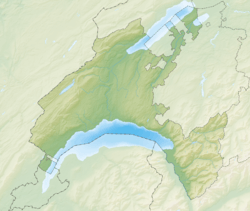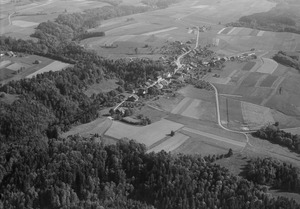Dommartin, Switzerland facts for kids
Quick facts for kids
Dommartin
|
||
|---|---|---|
|
||
| Country | Switzerland | |
| Canton | Vaud | |
| District | Gros-de-Vaud | |
| Area | ||
| • Total | 2.94 km2 (1.14 sq mi) | |
| Elevation | 730 m (2,400 ft) | |
| Population | ||
| • Total | 266 | |
| • Density | 90.5/km2 (234.3/sq mi) | |
| Postal code |
1041
|
|
| Surrounded by | Montaubion-Chardonney, Naz, Peyres-Possens, Poliez-le-Grand, Poliez-Pittet, Villars-Tiercelin | |
Dommartin was once a small town, also called a municipality, in the Gros-de-Vaud area of the canton of Vaud in Switzerland.
On July 1, 2011, Dommartin joined with three other towns: Naz, Poliez-le-Grand, and Sugnens. Together, they formed a new, larger town called Montilliez.
Contents
History of Dommartin
Dommartin is a very old place! It was first written about in the year 908. Back then, it was known as Domno Martino villa.
Geography and Land Use
In 2009, Dommartin covered an area of about 2.94 square kilometers (1.14 square miles). A big part of this land, about 59.5%, was used for farming. This means people grew crops or raised animals there.
Another large part, about 35%, was covered by forests. The remaining small portion, about 5.4%, was where buildings and roads were located.
Dommartin used to be part of the Echallens District. But in 2006, that district was changed. Dommartin then became part of the new Gros-de-Vaud district.
Dommartin's Coat of Arms
Every town has a special symbol called a coat of arms. Dommartin's coat of arms shows a red shield. On the shield, there is a silver wall with a tower. The wall and tower look like they have battlements, which are the parts on top of old castles where defenders could stand. The lines on the wall and tower are black.
Population and People
In 2009, Dommartin had a population of 266 people. Over the ten years before that (1999-2009), the number of people living there grew a little, by about 4.7%.
Most people in Dommartin speak French. In 2000, about 98.3% of the people spoke French. A few people also spoke German or English.
Many people living in Dommartin were born in the same canton, or state, of Vaud. Some were born in other parts of Switzerland, and a few were born outside of Switzerland.
In 2009, the population of Dommartin included children and teenagers. About 11.3% were under 10 years old, and another 11.3% were between 10 and 19 years old. Most of the population were adults, with a good number of people in their 30s and 40s. There were also older adults, including some over 80 years old.
Economy and Jobs
In 2010, Dommartin had a low unemployment rate of 4%. This means most people who wanted to work had a job.
Many people worked in the primary economic sector, which includes jobs like farming. There were also jobs in the secondary sector, like manufacturing or construction. The tertiary sector included jobs in services, such as transportation, science, education, and healthcare.
Most people who lived in Dommartin traveled to other towns for work. Only a few people worked within Dommartin itself. Many people used their own cars to get to work.
Religion in Dommartin
In 2000, most people in Dommartin belonged to one of two main Christian groups. About 22.8% were Roman Catholic, and about 62.2% belonged to the Swiss Reformed Church. A small number of people belonged to other Christian churches or to Islam. Some people did not belong to any church.
Education System
Many adults in Dommartin have a good education. In 2000, about 36.9% of the people had finished high school. About 14.1% had gone on to get a higher education from a university or a special college called a Fachhochschule.
In the 2009-2010 school year, there were 35 students in the Dommartin school area. In the Vaud canton, children can go to two years of pre-school before primary school. Primary school lasts for four years, and there were 23 students in Dommartin's primary school program. After that, students go to lower secondary school for six years, and there were 12 students in those schools.
Some students who lived in Dommartin went to schools in other towns. Also, a few students from other towns came to school in Dommartin.
 | Isaac Myers |
 | D. Hamilton Jackson |
 | A. Philip Randolph |





